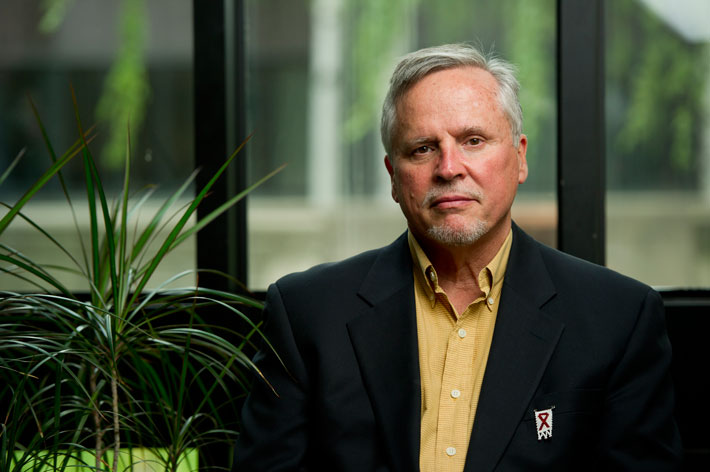3Qs: High time for an AIDS ‘wake-up call’

The United States will host the International AIDS Conference for the first time in 22 years from July 22-27 in Washington, D.C., where some 25,000 delegates from around the world will meet to evaluate the global effort to combat HIV/AIDS. Brook Baker, a professor in Northeastern’s School of Law, will be a featured speaker. We asked him to explain what should be done to better address AIDS in the global community and the significance of the conference’s return to American soil.
It has been 22 years since the U.S. has hosted the International AIDS Conference. What is the significance of the conference’s return to American soil?
For 21 years, the U.S. had a travel ban for people living with HIV and thus was not a fit sponsor for the International AIDS Conference. Now, after President Obama lifted the ban, it is fitting for the conference to reconvene here because we, too, have an HIV/AIDS crisis with more than 50,000 new infections a year (disproportionately concentrated in men who have sex with men, in African-American and Latino communities and in the Deep South). We had treatment waiting lists in the thousands, though President Obama just eliminated the current waiting list yesterday. Washington, D.C., the site of the conference, has a HIV prevalence rate above 3 percent — higher than many countries in Africa.
Moreover, the U.S. needs to do a better job of connecting people who are HIV positive to care. The conference is an opportunity for our AIDS wake-up call — we need to operationalize and fully fund our National AIDS Plan, ramp up targeted prevention for key populations, roll out clean needles and harm reduction for injecting drug users, increase rates of testing and ensure strong connections to treatment and care.
From a global standpoint, HIV treatment methods have improved, but people still face barriers in terms of education and access to care. What do you think is the most important next step for the global community to take to address HIV/AIDS?
Health literacy in communities vulnerable to HIV, especially among young people, is extremely poor. We continue to pretend that young people aren’t sexually active and refuse to give them youth-friendly and empowering learning opportunities about sexual and reproductive health.
Similarly, communities do not know the importance of routine HIV testing and early treatment, let alone that adherent antiretroviral therapy reduces the risk of infecting others by as much as 96 percent. Beyond the 8.8 million people now on treatment, nearly 7 million people are in immediate need of access to life-saving medicines. But they are living in a queue — a waiting line where 1.7 million people died in 2011. Another 20 million people will need access to treatment within the next five years.
Scaling up health and sex education and ensuring universal access to high-quality prevention, testing, treatment and care cannot be accomplished with the resources currently available. At this point, a treatment scale-up offers a twofer — it keeps young and middle-age adults alive to work, raise children, and care for the elderly, and it dramatically reduces the risk on onward transmission. The U.S. and its global partners must fulfill their repeated promises to make universal access a reality.
What role does Big Pharma play in creating barriers to universal access to treatment, and what can be done from a policy standpoint to begin to regulate its control?
When patent holders and data right holders have intellectual rights, they can exclude competition. In doing so, Big Pharma can set prices that maximize profits. In developing countries, they often do so by setting high prices for sales to economic elite, thereby depriving poor people of any affordable access to medicines. We are facing a treatment-cost time bomb.
With international allies, Health GAP has worked to stop pro-Pharma free-trade agreements or to alter their terms, and have been successful in temporarily delaying some agreements, such as those with Thailand and the Southern African Customs Union. I am currently consulting with the government of Uganda to revise its patent law and with activists in South Africa who are campaigning to revise theirs to ensure broader access to affordable medicines.
Increased availability of generic pharmaceuticals and biosimilar medicines should increase access to medicines, but Big Pharma often has 20-year monopolies that block generics and biosimilars. What we need are new incentive systems for therapeutical-targeted research and development on both neglected diseases and products adapted for use in poorer countries and a separate system to encourage robust generic competition among good quality producers.
Increased availability of generic pharmaceuticals and biosimilar medicines should increase access to medicines, but Big Pharma often has 20-year monopolies that block generics and biosimilars. What we need are new incentive systems for therapeutical-targeting research, development on both neglected diseases and products adapted for use in poorer countries and a separate system to encourage robust generic competition among good quality producers.





